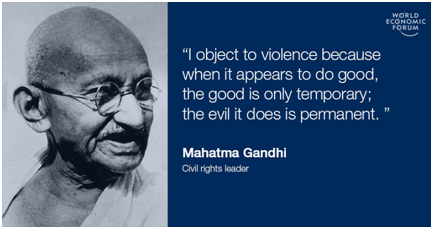
By Krishna Jha
As the summer with its heat is receding and winter, with its horror of ice cold nights shivers even in these warm days, India’s majority population, jobless, hungry, goes to bed to spend a night of miseries. It is October again, and on its second day was born the father of our nation, Mahatma Gandhi. Bapu, as he was called, is a presence that has always been there. For more than a century, it was always like in any crisis, we were confident of his protective aura. We earned our independence, we built our political system that was democratic, secular and socialist, we had our education system, health care, nationalization to slowly get rid of private ownership, and finally our composite culture that got evolved, and nurtured by the Constitution. And yet, there was the right, growing stronger all the time.
But when the BJP formed the government in 2014, a fault line started emerging. We had been the world’s largest democracy and once again there are serious attempts to put a wedge in our composite culture. We are a collective and also have individual identity, both alive and closely woven in the multiplicity that has been part of our culture since centuries. But today it is threatened, confronting a political project that seeks to promote Hindu authoritarianism along the lines of Nazi anti-Semitism. The project is premised on the same old idea that India is a Hindu state and minorities must subscribe to Hindu primacy – a position that threatens the very foundation of its democracy in which all citizens of every faith and all Hindus of every caste have equal standing.
As in the past, Hindu supremacists today belong to RSS and its large family of affiliates as well as organizations, that have mushroomed in the last couple of years under the rightist ideological umbrella, are full of contempt for minority communities. They look to Narendra Modi, a long-time member of the RSS who now heads the government, as the deliverer of Hindu Rashtra.
There are all out efforts to organize discourse in which Muslims would be treated as second class citizens. Government has been pursuing Hindutva majoritarian attacks. The most evident of them has been the Citizenship Amendment Act that came as a blow on our basic planks of democracy. Secularism has been stretched over to extreme negativism. It has been replaced by bare and barbaric Citizenship Amendment Act. For the first time, while defining and granting citizenship, religion has been made a criteria. It is almost the basic factor to spell out who is Indian citizen. It was an attack on our vision of India, and also on our Bapu, everything that he stood for, and along with him, on us all. The attacks are aimed at wiping out whatever we held with our entire democratic ethos, actually the reflection of the power Gandhiji held over the masses.
The Citizenship Amendment Act fast-tracks Indian citizenships to non-Muslim immigrants from three neighbouring countries. The bill provides citizenship to religious minorities from Pakistan, Bangladesh and Afghanistan. The government of Hindu nationalist forces led by BJP says this will give sanctuary to people fleeing religious persecution. Critics say the bill is part of BJP agenda to marginalise Muslims. It has been also called anti-Muslim law, which is open only to Hindu, Christian, Sikh, Buddhist, Parsi and Jain.
The act prompted widespread protests in the country especially in north eastern region which borders Bangladesh. The Citizenship Amendment Act (CAA) revises the 64 years of Indian citizenship law which prohibited illegal migrants from becoming Indian citizens. It defined illegal immigrants as foreigners who entered India without a valid passport or valid documents, or stayed beyond the permitted time. Illegal immigrants could be deported or jailed. The new Act also amends the provision which says a person must have worked for the federal government for at least 11 years, before one can apply for citizenship. Now there will be an exception for members of six religious minority communities if they can prove that they are from Pakistan, Afghanistan or Bangladesh. They will only have to live and work in India for six years to be eligible for citizenship or nationality of the country.
Efforts continue to make Muslims in the country the “other”. So are the attacks on them. The moment has come when the country feels the imperative need to rediscover Gandhi. Bapu could never be reined in because in his life time itself, he had comprehensively countered the project of Hindu Rashtra forcing its advocates, Rashtriya Swayamsevak Sangh (RSS) and Hindu Mahasabha, to the margins of Indian politics.
It was only Gandhi who could do it with his immense moral power and his all-out efforts as the supreme leader of the anti-British struggle that in a short span after Independence, the validity of the vision of a secular and democratic nation seemed beyond question. It rose above the turmoil of the time and became the unifying principle of the post-Independence India. It was this secular project of Independent India that was sought to be derailed by the assassination of Gandhi. Though the battle-lines are emerging again, Gandhi lives. So does our composite culture. (IPA Service)
The post Time Has Come To Rediscover The Secular Principles Of Mahatma Gandhi first appeared on Latest India news, analysis and reports on IPA Newspack.


